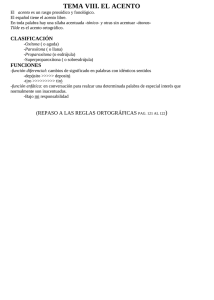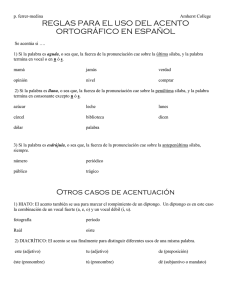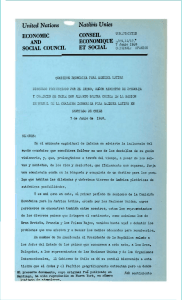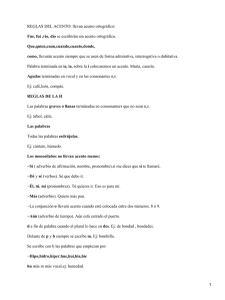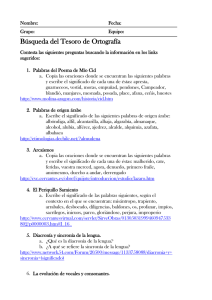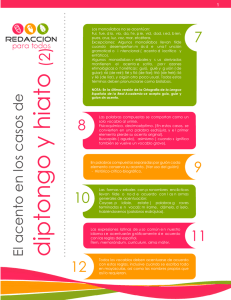Palabras tomadas del español en el mösiehuali̱ (Náhuatl de
Anuncio
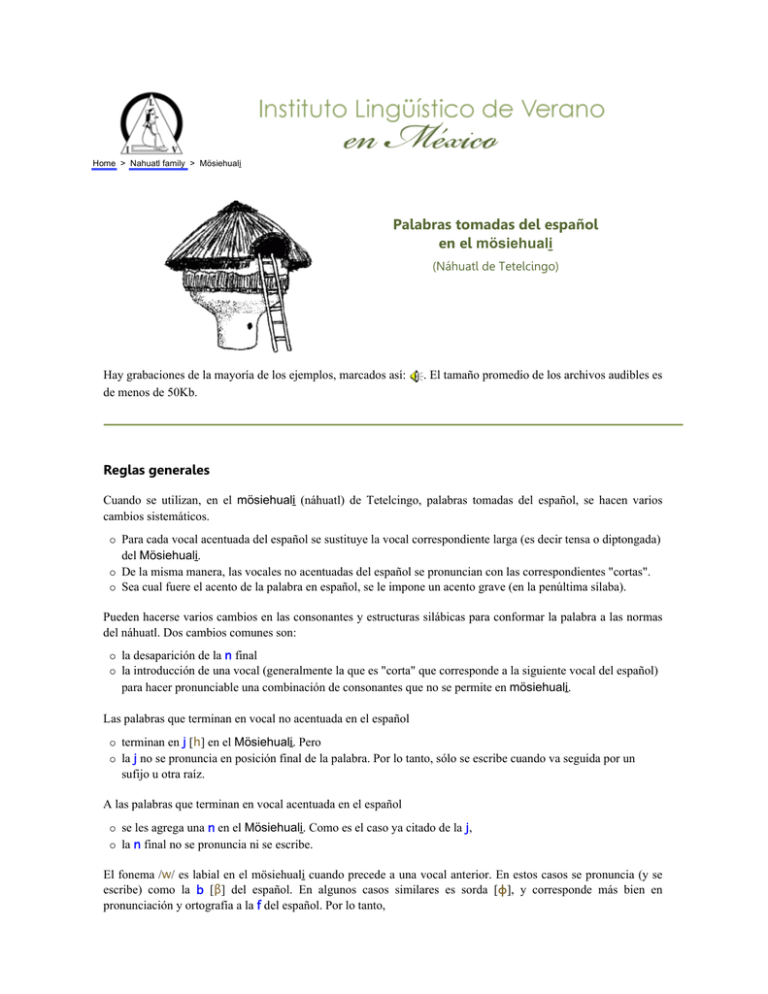
Home > Nahuatl family > Mösiehuali̱
Palabras tomadas del español
en el mösiehuali̱
(Náhuatl de Tetelcingo)
Hay grabaciones de la mayoría de los ejemplos, marcados así:
de menos de 50Kb.
. El tamaño promedio de los archivos audibles es
Reglas generales
Cuando se utilizan, en el mösiehuali̱ (náhuatl) de Tetelcingo, palabras tomadas del español, se hacen varios
cambios sistemáticos.
{
{
{
Para cada vocal acentuada del español se sustituye la vocal correspondiente larga (es decir tensa o diptongada)
del Mösiehuali̱ .
De la misma manera, las vocales no acentuadas del español se pronuncian con las correspondientes "cortas".
Sea cual fuere el acento de la palabra en español, se le impone un acento grave (en la penúltima sílaba).
Pueden hacerse varios cambios en las consonantes y estructuras silábicas para conformar la palabra a las normas
del náhuatl. Dos cambios comunes son:
{
{
la desaparición de la n final
la introducción de una vocal (generalmente la que es "corta" que corresponde a la siguiente vocal del español)
para hacer pronunciable una combinación de consonantes que no se permite en mösiehuali̱ .
Las palabras que terminan en vocal no acentuada en el español
{
{
terminan en j [h] en el Mösiehuali̱ . Pero
la j no se pronuncia en posición final de la palabra. Por lo tanto, sólo se escribe cuando va seguida por un
sufijo u otra raíz.
A las palabras que terminan en vocal acentuada en el español
{
{
se les agrega una n en el Mösiehuali̱ . Como es el caso ya citado de la j,
la n final no se pronuncia ni se escribe.
El fonema /w/ es labial en el mösiehuali̱ cuando precede a una vocal anterior. En estos casos se pronuncia (y se
escribe) como la b [β] del español. En algunos casos similares es sorda [ɸ], y corresponde más bien en
pronunciación y ortografía a la f del español. Por lo tanto,
{
{
hu ([w]) se vuelve b o f cuando la vocal siguiente es anterior
b o f se vuelven hu o ju [W] si la vocal siguiente es posterior
Las consonantes pueden sufrir los efectos de otras reglas morfofonémicas del mösiehuali̱ . Por ejemplo, las
obstruyentes generalmente se convierten en j [h] cuando preceden a otra obstruyente igual (o casi igual). Un caso
tal es la de cruz, en la que z [s] se vuelve j ante tz.
Préstamos antiguos
En préstamos antiguos, se nota menos tolerancia para algunos fonemas del español que sí ocurren en préstamos
más recientes. Por ejemplo:
{
{
{
Las oclusivas o fricativas sonoras b, d y g se vuelven sordas: p, t y c/qu [k]
la d puede pronunciarse l o r
la r cambia a l o a veces a t
Las combinaciones de fonemas que no existen en palabras nativas del náhuatl se simplifican o se reinterpretan.
Por ejemplo:
{
{
br puede volverse pl o pel
ue puede volverse owe
La s y la j del español antiguo no se pronunciaban como las modernas. Por lo tanto, en préstamos antiguos,
{
{
s suele corresponder a x [š]
j suele corresponder a x [š]
También en los préstamos antiguos parece que había más tendencia de oír vocales largas. Vocales que en el
español llevan acento secundario, o que son seguidas de una nasal, pueden ser interpretadas como largas.
Varias palabras tomadas tienen dos formas, una antigua y otra más reciente. En general, las antiguas tienen más
cambios, y las recientes menos. Los ejemplos que se dan abajo son sábado, cruz y pobre.
Añadidura de afijos
A cualquier raíz producida según estas reglas, se pueden añadir los afijos gramaticales normales de esa clase en
mösiehuali̱ . También puede haber cambios en el significado de la palabra.
Ejemplos
Las formas que siguen ejemplifican estos patrones. (Los archivos audibles que los acompañan son de un promedio
de 40K cada uno.)
Náhuatl
Español
Resumen de los cambios
bute
[βúte]
bote
ó > u (la correspondiente larga), desaparece la j [h] final
nobutejua
[noβutéhwɔ]
mis botes
ó > u, afijos no- mi y -hua plural poseído, aparece la j [h] final
arus
[ářus]
arroz
[ar̃ós]
ó > u, rr > r, acento grave
capi̱ tö
a
[kap Ítɔ ]
capi̱ tönte
a
[kap Itɔ́ nte]
Josie
i
[hʊ́s e]
Tomös
a
[tʊ́mɔ s]
Mönobiel
a
i
á > ö, i no acentuada > i̱, desaparece la n, acento grave
capitanes
lo mismo, con plural -te, aparece la n final
José
[hosé]
é > ie, acento grave
Tomás
á > ö, acento grave
Manuel
an é se interpreta como ànuwé, é > ie, à > ö, u no acentuada
u
[mɔ nóβ el]
[man él]
Xohuönajtzi
a
capitán
[kapitán]
s
[šowɔ náht i]
fiebes
i
[hɸ éβes]
xöbatu
a
[šɔ βátu]
söbro
a
[sɔ́ βřo]
xapu
[šápu]
cafie
i
[káhɸ e]
cafientic
i
[kahɸ éntIk]
corujtzi
s
[kořúht i]
crujtzi
s
[křúht i]
Juana
[hwána]
(forma antigua)
sábado
s > x, á > ö, d > t, ò > u, acento grave
(forma más reciente)
á > ö, ábadò > ábro, acento grave (preservado)
jabón
[haβón]
ó > u, b > p, j > x, desaparece la n final
café
[kafé]
é > ie, f > hw, acento grave, no aparece la n final
color café
añadir -ti̱c adjetivo, aparece la n final
cruz
[křus]
(forma antigua)
cruz
pobre
i
j [h] final, acento grave
sábado
[sáβaðò]
prube
[přúβe]
[šompl elóhme]
ju [hw] > xohu [šow], á > ö, añadir -tzi honorífico, aparece la
hw > f [hw > hɸ], é > ie
pobre
[póβře]
xomplielojme
> o, w > βante vocal anterior, acento grave
jueves
[hwéβes]
porube
[pořúβe]
Di̱ us
[ðÍyus]
u
Dios
i
[ð ós]
sombrero(s)
[sombřeřo]
crú > corú, añadir -tzi honorífico, s > j [h] antes de tz
(forma más reciente)
añadir -tzi honorífico, s > j [h] antes de tz
(forma antigua)
póbr > prób > porób, ó > u, no aparece la j [h] final
(forma más reciente)
póbr > prób, ó > u, no aparece la j [h] final
ó > u, i > i̱ , acento grave
s > x, br > pl, r > l, é > ie, añadir me plural, aparece la j [h]
final, acento grave
xöntocalco
santo
[sánto]
a
[šɔ ntokálko]
qui̱ xtiöno /
qui̱ xti̱ yöno
cristiano
[kIšt ɔ́ no] / [kIštIyɔ́ no]
i a
a
[křist áno]
xejnulajte /
xenulajte
señora(s)
[šehnuláhte] / [šenuláhte]
i
y
[señ óřa]
á > ö, s > x, añadir cal-co lugar de casa = recinto de un
santo, por excepción no aparece la j [h] final
afuereño
i
á > ö, i no acentuada > i̱, cr > qu [kr > k], s > x, (t > ti̱y),
no aparece la j [h] final
afuereñas
ó > u, s > x, ñ > (j)n, r > l, añadir -te plural, aparece la j [h]
final
Nombres propios
Los nombres propios de los adultos normalmente llevan un honorífico. Los nombres de los varones llevan la
forma casi-prefijal ru don. (Se deriva de don según procesos normales para los préstamos antiguos.) Así, don
Manuel se dice en Mösiehuali̱
ru Mönobiel. Los nombres de las mujeres adultas (con la excepción de la
misma mujer de uno) llevan el sufijo honorífico -tzi, como en
Xohuönajtzi (doña) Juana.
Verbos tomados del español
Cuando los verbos se toman prestados, se utiliza la forma infinitiva[2] del español (la forma que termina en -ar, er o -ir). A esa base se le añade la terminación -oa [-owa] si el verbo es transitivo, o -i̱bi̱ si es intransitivo.
Luego se añaden los prefijos de sujeto y objeto apropiados, y cualquier otro afijo de tiempo, aspecto, etc., que se
requiera. Por ejemplo:
Náhuatl
pasöri̱ bi̱
a
[pasɔ řÍβI]
pasöri̱ bi̱ s
a
[pasɔ řÍβIs]
qui̱ pasöroa
a
[kIpasɔ řówa]
qui̱ mpasöro
Español
pasa
[pasář]
á > ö, añadir -i̱bi̱, acento grave
pasará
Lo mismo, más -s futuro
le pasa
á > ö, añadir -oa, marcar objeto qui̱ -
les pasó
a
[kImpasɔ́ řo]
cöhuantöroa
lo aguanta
a
[àɣ antář]
lo consentíamos
[konsentíř]
a
[kɔ wantɔ řówa]
ti̱ jconsentiroöya
a
[tIhkonsentiřowɔ́ ya]
conbenieri̱ bi̱
i
[komβen eřÍβI]
mi̱ tzcombenieroa
s
i
[mIt komβen eřówɔ]
Resumen de los cambios
w
lo mismo, con qui̱m- a ellos, y supresión de -a final en
pretérito
á/à > ö, gu > hu, añadir -oa, objeto c-, acento grave
añadir -oa y otros afijos, acento
conviene
[komβeníř]
convenir > oído/supuesto como convener, é > ie, añadir -i̱bi̱,
te conviene
añadir -oa, marcar objeto mi̱tz-te, acento grave
acento grave
Frutas
Un grupo de préstamos que es de especial interés consiste en nombres de productos agrícolas como las frutas, con
la adición del nombre de un ave, la paloma. Parecen haberse tomado prestados en forma plural, aunque su
significado suele ser singular, y sus nombres terminan en x en vez de la s del español moderno. También exhiben
otras irregularidades. Por ejemplo: alöxöx naranja y plötöni̱x plátano tienen la vocal a larga, ö, por una vocal
no acentuada, además de la vocal acentuada (donde es esperada); plötöni̱x tiene i̱ donde plátano tiene o; tres de
estas palabras terminan con xöx o xox (que casi no se distinguen), patrón que no se encuentra en otras palabras
de la lengua, etcétera.
Náhuatl
öhuax
a
[ɔ́ waš]
plötöni̱ x
a
a
[plɔ tɔ́ nIš]
nobiexöx
a
[noβi̱éšɔ š]
öxox
a
[ɔ́ šoš]
icox
[íkoš]
alöxöx
a
a
[alɔ́ šɔ š]
palumax
[palúmaš]
Español
habas
[áβas]
Resumen de los cambios
á > ö, β> w ante vocal no-anteriors > x
á > ö, a > ö (excepcional), o > i̱ (excepcional), s > x, acento
plátano(s)
[plátanos]
grave
nuez, nueces
n é se interpreta como nowé, é > ie, w > β ante vocal anterior,
u
[n éses]
u
a
s > x, e > ɔ (excepcional)
ajo(s)
[áhos]
á ö, j > x, s > x
higo(s)
[ígos]
g > k, s > x
naranja(s)
[nařáŋhas]
paloma(s)
[palómas]
n interpretado como artículo(i)n + palabra separada aranja, r >
l, án > ö, a > ö (excepcional), j > x, s > x
ó > u, acento
--David Tuggy T.
El hablante del mösiehuali̱ cuya voz se escucha pronunciando estas palabras es Trinidad Ramírez Amaro.
Spanish Borrowings
in Mösiehuali̱
(Tetelcingo Nahuatl)
There are recordings of most of the examples, marked
. The sound files average less than 50Kb.
General rules
When loan words from Spanish are brought into Mösiehuali̱ (Tetelcingo Nahuatl) several kinds of systematic
changes are made.
z
z
z
For each stressed vowel in Spanish, the corresponding long (i.e. tense or diphthongized) Mösiehuali̱ vowel is
substituted.
Similarly, the "short" vowels are substituted for the corresponding Spanish un-stressed vowels.
Regardless of where the stress falls in Spanish, the normal Mösiehuali̱ penultimate stress is imposed.
Various changes in the consonants and syllable structure may also occur, in order to bring the word into conformity
with the normal patterns of Nahuatl. Two common changes are:
z
z
the disappearance of a word-final n
the insertion of a vowel (often the "short" version of whichever Spanish vowel comes next) in order to break up
and make pronounceable clusters of consonants which are not permitted in Mösiehuali̱ .
Words that in Spanish end in an unstressed vowel
z
z
end in j [h] in Mösiehuali̱ . But,
word-final j is not pronounced. As a result, this j is written only when a suffix or another stem follows it.
To words that in Spanish end in a stressed vowel
z
z
an n is added in Mösiehuali̱ . As in the above-mentioned case of j,
the n is neither pronounced nor written when in final position.
The phoneme /w/ is labial in Mösiehuali̱ when it precedes a front vowel. In such cases it is pronounced (and written)
like the b [β] of Spanish. In some of those cases it is voiceless [ɸ], and thus corresponds, both in pronunciation and
orthography, rather to the f of Spanish. As a result:
z
z
Spanish hu ([w]) shows up as b or f preceding a front vowel
b and f become hu or ju [W] preceding a back vowel
Consonants may also suffer the effects of other morphophonemic rules of Mösiehuali̱ . For example, obstruents
generally become j [h] when they precede an identical (or closely similar) obstruent. One such case is that of cruz
cross, where z [s] becomes j before tz.
Older borrowed forms
In loans which are a century or more old, there was less tolerance for some of the foreign phonemes which are
permitted in later borrowings. For instance:
z
z
z
the voiced stops or fricatives b, d, and g, turn voiceless: p, t, and c/qu [k]
d may be pronounced l or r
r becomes l or sometimes t
Combinations of phonemes which do not exist in native Nahuatl words may be simplified or reinterpreted. For
example:
z
z
br may become pl or pel
ue may become owe
Spanish s and j [h] were pronounced differently in the time of the older loans, As a result:
z
z
s often becomes x [š]
j often becomes x [š]
In the older borrowings it seems also that there was more of a tendency to hear long vowels. Vowels that in Spanish
carry a secondary accent, or which are followed by a nasal, may be interpreted as long.
A number of borrowed words have two forms, one older and the other more recent. Generally the older borrowings
involve more changes, the newer fewer. Examples given below include Sabado Saturday, cruz cross, and pobre poor.
Adding affixes
To any stem that is produced according to these rules, the normal Mösiehuali̱ affixes for the appropriate grammatical
class (part of speech) can be added. Sometimes the meaning of the stem will shift as well.
Examples
The following examples exemplify these patterns. (The sound files attached to the examples average about 40K.)
Nahuatl
Original Spanish
bute
[βúte]
bote
nobutejua
[noβutéhwɔ]
mis botes
arus
[ářus]
arroz
[ar̃ós]
capi̱ tö
a
[kapÍtɔ ]
capi̱ tönte
Summary of the Changes
ó > u (the corresponding long
vowel), final j [h] does not appear
ó > u, affixes no- my and -hua
plural possessed, final j [h] appears
ó > u, rr > r, penultimate stress
capitán
[kapitán]
á > ö, non-stressed i > i̱ , n
capitanes
same, plus plural -te; final n appears
disappears, penultimate stress
Meaning of the
original Spanish
(tin) can
my (tin) cans
rice
captain
captains
a
[kapItɔ́ nte]
Josie
i
[hʊ́s e]
Tomös
a
[tʊ́mɔ s]
José
[hosé]
é > ie, penultimate stress
Joseph
Tomás
á > ö, penultimate stress
Thomas
u
an é interpreted as ànuwé, é > ie, à
Mönobiel
a
i
[mɔ nóβ el]
Xohuönajtzi
a
s
[šowɔ náht i]
fiebes
i
[hɸ éβes]
xöbatu
a
[šɔ βátu]
Manuel
u
[man él]
Juana
[hwána]
jueves
[hwéβes]
sábado
[sáβaðò]
> ö, unaccented u > o, w > β
before a front vowel, penultimate
Immanuel
stress
ju [hw] > xohu [šow], á > ö, add tzi honorific, final j [h] appears,
Jane
penultimate stress
hw > f [hw > hɸ], é > ie
(older form)
s > x, á > ö, d > t, ò > u,
Thursday
Saturday
penultimate stress
(newer form)
söbro
a
[sɔ́ βřo]
xapu
[šápu]
cafie
i
[káhɸ e]
cafientic
i
[kahɸ éntIk]
corujtzi
s
[kořúht i]
crujtzi
s
[křúht i]
porube
[pořúβe]
sábado
á > ö, ábadò > ábro, penultimate
Saturday
stress (preserved)
jabón
[haβón]
ó > u, b > p, j > x, final n
disappears
café
[kafé]
é > ie, f > hw, final n does not
color café
add -ti̱c adjective, final n appears
cruz
[křus]
(older form)
appear, penultimate stress
crú > corú, add -tzi honorific, s > j
soap
coffee
brown
(coffee-color)
cross
[h] before tz
cruz
pobre
[póβře]
(newer form)
add -tzi honorific, s > j [h] before tz
(older form)
póbr > prób > porób, ó > u, final j
cross
poor
[h] does not appear
prube
[přúβe]
pobre
(newer form)
póbr > prób, ó > u, final j [h] does
poor
not appear
Di̱ us
[ðÍyus]
Dios
i
[ð ós]
xomplielojme
sombrero(s)
[sombřeřo]
i
[šompl elóhme]
xöntocalco
santo
[sánto]
a
[šɔ ntokálko]
ó > u, i > i̱ , penultimate stress
God
s > x, br > pl, r > l, é > ie, add me
plural, final j [h] appears, penultimate
hats
stress
á > ö, s > x, add cal-co houseplace = saints' shrine, final j [h]
saint
exceptionally fails to appear
outsider, foreigner
qui̱ xtiöno /
qui̱ xti̱ yöno
i a
a
cristiano
i
[kIšt ɔ́ no] / [kIštIyɔ́ no]
[křist áno]
xejnulajte /
xenulajte
[šehnuláhte] / [šenuláhte]
señora(s)
y
[señ óřa]
á > ö, unstressed i > i̱, cr > qu [kr
i
> k], s > x, (t > ti̱y), final j [h] does
Christian
not appear.
outsiders, foreigners (women)
ó > u, s > x, ñ > ( j) n, r > l, add -
ladies, my ladies
te plural, final j [h] appears
People's names
The names of adults are marked honorifically. Adult men's names normally take the almost-prefixal form ru sir, Mr.
(It is derived from the Spanish form don by normal processes for older borrowings.) So don Manuel comes out in
Mösiehuali̱ as
ru Mönobiel. The names of adult women (with the exception of one's own wife) take the
honorific suffix -tzi, as in
Xohuönajtzi (doña) Juana or Lady Jane.
Borrowed verbs
When verbs are borrowed from Spanish into Mösiehuali̱ , the infinitive form is used (the form that ends in -ar, -er, or
-ir). To it is added the ending -oa [-owa] if the verb is transitive, or -i̱bi̱ if it is intransitive. Then the appropriate
subject and object prefixes are added, and any other affixes of time, aspect, etc. that may be required. For example:
Nahuatl
pasöri̱ bi̱
a
[pasɔ řÍβI]
pasöri̱ bi̱ s
a
[pasɔ řÍβIs]
qui̱ pasöroa
a
[kIpasɔ řówa]
qui̱ mpasöro
a
[kImpasɔ́ řo]
Original Spanish
Summary of the Changes
Meaning of the
original Spanish
pasa
[pasář]
á > ö, add -i̱bi̱ , penultimate stress
it happens
pasará
The same, plus -s future
it will happen
le pasa
á > ö, add -oa, mark object with
qui̱-
it happens to him/her
les pasó
the same, with qui̱m- them, and
deletion of final -a in preterite.
it happened to them
cöhuantöroa
a
lo aguanta
a
w
[kɔ wantɔ řówa]
[àɣ antář]
ti̱ jconsentiroöya
a
[tIhkonsentiřowɔ́ ya]
conbenieri̱ bi̱
i
[komβen eřÍβI]
mi̱ tzcombenieroa
s
i
[mIt komβen eřówɔ]
lo consentíamos
[konsentíř]
conviene
[komβeníř]
te conviene
á/à > ö, gu > hu, add -oa, mark
object c-, penultimate stress
add -oa and other affixes,
penultimate stress
convenir > mistakenly borrowed as
if it were convener, é > ie, add -i̱bi̱,
penultimate stress
add -oa, mark object mi̱tz-you sg.,
penultimate stress
he/she bears it
we spoiled him/her
it is proper,
appropriate
it behooves you
Fruits
A particularly interesting group of loans consists of names of certain agricultural products, mostly fruits, with the
inclusion of a bird, the dove or pigeon. These apparently were borrowed in pluralized form even though their
meanings may be singular, and they end in x rather than the s of the modern Spanish form. They also exhibit certain
other anomalies; for instance, both alöxöx orange and plötöni̱x banana have the long a vowel ö for a non-stressed
a as well as a stressed one (where it is expected); plötöni̱x has i̱ where the Spanish has o; three of these words end
in xöx or the almost indistinguishably similar xox, which no other words of the language do, and so forth.
Nahuatl
öhuax
a
[ɔ́ waš]
plötöni̱ x
a
a
[plɔ tɔ́ nIš]
nobiexöx
a
[noβi̱éšɔ š]
öxox
a
[ɔ́ šoš]
icox
[íkoš]
alöxöx
a
a
[alɔ́ šɔ š]
palumax
[palúmaš]
Original Spanish
habas
[áβas]
plátano(s)
[plátanos]
Summary of the Changes
á > ö, β> w before a non-front
vowel, s > x
Meaning of the
original Spanish
chickpeas
á > ö, a > ö (exceptional), o > i̱
(exceptional), s > x, penultimate
banana(s)
stress
u
nuez, nueces
u
[n éses]
n é interpreted as nowé, é > ie, w
> β before a front vowel, s > x, e >
nut(s)
a
ɔ (exceptional)
ajo(s)
[áhos]
á > ö, j > x, s > x
garlic(s)
higo(s)
[ígos]
g > k, s > x
fig(s)
naranja(s)
[nařáŋhas]
paloma(s)
[palómas]
n interpreted as article (i)n +
separate word aranja, r > l, án > ö,
orange(s)
a > ö (exceptional), j > x, s > x
ó > u, stress
dove(s), pigeon(s)
--David Tuggy
The Mösiehuali̱ speaker whose voice is heard in the sound files is Trinidad Ramírez Amaro.
© 2008 Instituto Lingüístico de Verano, A.C.
Derechos reservados. Puede reproducirse para fines no lucrativos siempre y cuando no se altere en forma alguna.
All rights reserved. May be reproduced for nonprofit use so long as it is not modified in any way.
